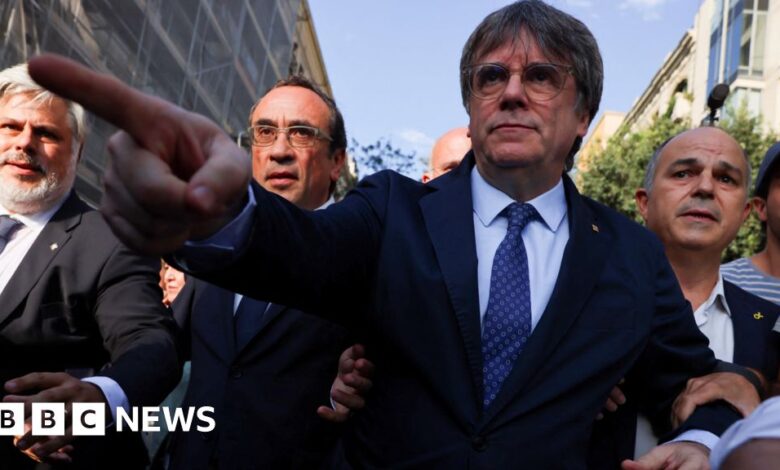Police hunt former Catalan separatist leader after return from exile

Police in Barcelona are hunting for former Catalan separatist leader Carles Puigdemont, who made a dramatic return to Spain after seven years in exile despite facing an arrest warrant.
Mossos d’Esquadra – the Catalan police – have set up barricades inside Barcelona and led them out of the city as part of Operation Jaula – or “cage” – in the search for Mr Puigdemont, who was seen leaving a protest this morning in a car.
The operation is said to have ended hours later, although Mr Puigdemont appears to have remained at large.
He has lived in Brussels for much of the past several years after police charged him with involvement in a failed bid for Catalan independence in 2017.
At the time, Catalonia’s pro-independence leaders including Mr Puigdemont held a referendum – ruled illegal by Spain’s constitutional court – and then declared independence for the region. Madrid imposed direct rule over the region shortly afterwards and Mr Puigdemont fled to Belgium.
On Thursday morning, Mr Puigdemont gave a brief speech to hundreds of supporters gathered near the Catalan parliament building in Barcelona, just ahead of the inauguration of the new head of the Catalan government.
He shouted “Long live a free Catalonia!” before saying he had returned “to remind you that we are still here”.
“Holding a referendum is not and will never be a crime,” he added.
Then Mr Puigdemont disappeared.
Many expected him to appear inside the capitol building in time for the inauguration ceremony at 10:00 (08:00 GMT), but he was nowhere to be seen and his whereabouts remain unclear.
Late on Thursday, one of his allies said he had spoken to Mr Puigdemont since his escape.
In a post on X, Lluís Llach, president of the pro-independence Catalan Parliament, said Mr Puigdemont was “healthy, safe and above all free”.
Mr Puigdemont’s lawyer, Gonzalo Boye, made similar comments on Thursday evening, when he told local television station TV3 “[Puigdemont] went home, where he works” – but did not specify where.
A spokesman for the Mossos d’Esquadra said a Catalan police officer had been arrested on suspicion of helping Mr Puigdemont escape.
According to Spanish media, the police officer is believed to have owned the car that Mr Puigdemont used to escape after speaking. Police later arrested a second police officer.
Road barriers were erected around Barcelona on Thursday morning and Spanish television also showed images from La Jonquera, a city on the border with France, where police could be seen stopping cars and checking shoes.
Puigdemont ally Aleix Sarri criticised the police operation at X, saying: “Hundreds of police surrounded Barcelona to arrest President Puigdemont. A manhunt paid for with public money to please the powerful in Madrid. This is not what a democracy does.”
Police reportedly used pepper spray to disperse Puigdemont supporters gathered near the parliament building.
Ignacio Garriga of the far-right Vox party, which is strongly opposed to Catalan independence, said Vox would “do everything necessary to ensure Puigdemont is arrested”.
Some Spanish commentators have expressed confusion over the failure of police to arrest Mr Puigdemont despite his announcement earlier this week that he would return to Catalonia.
On Wednesday, he posted a video on X saying he had “begun his journey back from exile” and added that his arrest was illegal and arbitrary.
There appear to be a number of motives behind Carles Puigdemont’s return to Spain.
First, he wanted to pressure the government to adopt The country’s new amnesty law – withdraws legal action against Catalan nationalists – for him, after the Supreme Court disqualified him from applying for a patent on technical grounds.
He also aimed to sabotage the inauguration of Socialist Salvador Illa as Catalonia’s new president today.
Spain’s former health minister will become the region’s first non-nationalist leader since 2010.
Equally important for Mr Puigdemont is to position himself and his Junts per Catalunya (JxCat) party as the main force in favour of independence.
He wants to portray his separatist rival, the left-wing Catalan Republican Party (ERC), as complicit in Spanish federalism for agreeing to support Mr Illa’s inauguration.
Until the new regional government is formed, the ERC will remain responsible for running the Catalan police force, making the return of the former regional president particularly uncomfortable for the party.

